What Research Says About Natural Nootropics for Anxiety
Introduction
Anxiety is one of the most common mental health struggles worldwide. From constant worry and racing thoughts to physical symptoms like rapid heartbeat and sweaty palms, it can impact daily life in big ways. While therapy and medication remain the gold standard for treating anxiety, there’s growing interest in natural supplements — particularly nootropics — that may support calmer moods, clearer thinking, and better stress resilience.
But do these natural brain-boosters really work? And what does the science say about their role in reducing anxiety?
This in-depth guide explores natural nootropics for anxiety, how they may work in the brain, and how you can integrate them into a broader lifestyle routine that includes nutrition, breathwork, and therapy. Let’s dive in. 🌊
Looking for online therapy for people with Social Anxiety? Click Here.
🌱 What Are Nootropics?

The term nootropics refers to compounds that can enhance brain function, such as memory, focus, learning, or emotional regulation. Some are synthetic (like certain smart drugs), while others are naturally occurring in plants, herbs, or foods.
For anxiety specifically, natural nootropics are often favored because they may:
- Support neurotransmitter balance (serotonin, dopamine, GABA).
- Reduce cortisol and stress hormones.
- Improve resilience to stressors.
- Support brain plasticity and calm thinking.
Unlike pharmaceuticals, natural nootropics often act more gently, making them suitable for long-term support alongside therapy or lifestyle strategies.
Looking for supplements for people with Social Anxiety? Click here.
🧠 The Brain-Anxiety Connection
To understand how nootropics may help, it’s important to know what happens in the brain during anxiety.
GABA: This calming neurotransmitter helps quiet neural activity. People with anxiety often have lower GABA levels.
Serotonin: Supports mood balance and emotional stability. Low serotonin is linked with anxiety and depression.
Dopamine: Regulates motivation and reward. Imbalances can lead to anxious overthinking.
Cortisol: The main stress hormone. Chronic stress and high cortisol can keep the body in a constant state of “fight-or-flight.”
Nootropics aim to restore balance in these systems, making the brain less reactive to stress and better able to recover.
🌿 Popular Natural Nootropics for Anxiety
Let’s explore the most researched natural compounds that may support calmer moods.
🍵 L-Theanine (Found in Green Tea)
How it works:
- Boosts alpha brain waves, promoting relaxation without drowsiness.
- Increases GABA, dopamine, and serotonin activity.
- Reduces physiological stress responses (like high heart rate).
Research highlights:
Several studies show that L-theanine can reduce anxiety in stressful situations (like public speaking) and improve sleep quality without sedation.
How to use:
- Dose: ~100–400 mg per day.
- Works well in combination with caffeine for calm focus.
🌿 Ashwagandha (Adaptogen Herb)
How it works:
- Lowers cortisol levels.
- Modulates the HPA axis (the stress-response system).
- Improves resilience to chronic stress.
Research highlights:
Randomized controlled trials (RCTs) suggest ashwagandha significantly reduces stress and anxiety compared to placebo.
How to use:
- Dose: ~300–600 mg per day of standardized extract.
- Best taken daily for 8+ weeks.
🌸 Rhodiola Rosea
How it works:
- Enhances dopamine and serotonin signaling.
- Improves energy and stress resilience.
- Reduces fatigue-related anxiety.
Research highlights:
Some studies show rhodiola improves symptoms of stress-related fatigue and anxiety within weeks.
How to use:
- Dose: ~200–400 mg per day.
- Best taken earlier in the day (can be stimulating).
🐟 Omega-3 Fatty Acids (EPA & DHA)
How it works:
- Reduces neuroinflammation.
- Supports serotonin and dopamine pathways.
- Balances stress hormone responses.
Research highlights:
Meta-analyses show omega-3 supplementation (especially EPA) can reduce anxiety symptoms in both healthy individuals and those with clinical disorders.
How to use:
- Dose: ~1–3 g per day of combined EPA/DHA.
- Choose high-quality fish oil or algae-based supplements.
🌿 Bacopa Monnieri
How it works:
- Enhances serotonin and GABA activity.
- Improves memory and focus while reducing anxiety.
- Works as an adaptogen, helping the body adapt to stress.
Research highlights:
Studies indicate bacopa improves cognition and reduces anxiety after consistent use (8–12 weeks).
How to use:
- Dose: ~300–600 mg per day of standardized extract.
- Needs time to build effect.
🍄 Lion’s Mane Mushroom (Hericium erinaceus)
How it works:
- Stimulates nerve growth factor (NGF), supporting brain plasticity.
- May reduce inflammation and oxidative stress.
- Supports mood balance.
Research highlights:
Preliminary studies show improvements in mild anxiety and depression with lion’s mane supplementation.
How to use:
- Dose: ~500–3000 mg per day.
- Can be taken as powder, capsule, or in functional coffees.
🌿 Ginkgo Biloba
How it works:
- Improves cerebral blood flow and oxygen delivery.
- Modulates serotonin and dopamine receptors.
- May reduce tension and improve cognitive clarity.
Research highlights:
Some trials suggest ginkgo can reduce anxiety in people with generalized anxiety disorder.
How to use:
- Dose: ~120–240 mg per day.
Looking for supplements for people with Social Anxiety? Click here.
🧘 Breathwork and Nootropics: A Powerful Duo

While supplements can shift brain chemistry, breathwork directly calms the nervous system. Together, they can create a strong foundation for anxiety management.
- Slow diaphragmatic breathing reduces cortisol and activates the parasympathetic nervous system.
- Box breathing (4-4-4-4) calms racing thoughts before stressful events.
- Alternate nostril breathing balances left and right brain hemispheres, enhancing calm focus.
Pairing L-theanine or ashwagandha with a daily breathwork practice may amplify their effects, creating more resilience against stress triggers.
Want to try Breathwork? Click Here.
💊 Building a Supplement Routine for Anxiety
Here’s a sample day plan for integrating nootropics into your routine:
- Morning 🌅: Rhodiola + Omega-3s (boosts mood and resilience for the day).
- Afternoon ☀️: Bacopa + Lion’s Mane (supports focus without jitters).
- Evening 🌙: Ashwagandha + L-theanine (reduces cortisol and supports deep rest).
This routine can be combined with nutrition (leafy greens, whole grains, omega-3-rich foods), breathwork, and therapy for best results.
🥦 Foods That Support Nootropic Effects

Supplements work best alongside a brain-friendly diet. For anxiety, focus on:
- Leafy greens (magnesium, folate for neurotransmitter support).
- Fatty fish (salmon, sardines for omega-3s).
- Fermented foods (yogurt, kimchi, kefir for gut-brain axis support).
- Nuts and seeds (zinc, magnesium for mood balance).
Avoid or limit:
- Excess caffeine (can spike cortisol).
- Refined sugar (blood sugar crashes worsen anxiety).
- Processed foods (pro-inflammatory and disruptive to mood).
🛋️ Therapy and Lifestyle Practices
Even the best nootropics won’t replace the benefits of therapy, lifestyle, and self-care. For long-term success, combine them with:
- Cognitive Behavioral Therapy (CBT) to reframe anxious thought loops.
- Mindfulness meditation to reduce overthinking.
- Exercise (especially aerobic) to lower cortisol and increase dopamine.
- Healthy sleep habits to restore neurotransmitter balance.
Looking for online therapy for people with Social Anxiety? Click Here.
⚖️ Limitations of Natural Nootropics
While promising, natural nootropics aren’t magic pills. Some limitations include:
- Effects can be subtle and gradual.
- Research is still emerging for many herbs and compounds.
- Individual responses vary — what calms one person may not work for another.
- Supplements should be high-quality and tested for purity.
🌟 Final Thoughts
Natural nootropics offer exciting possibilities for supporting anxiety relief. By balancing neurotransmitters, reducing cortisol, and enhancing stress resilience, they provide a gentle yet powerful addition to therapy, nutrition, and breathwork.
If you’re considering adding nootropics to your routine:
- Start with one or two well-researched options.
- Track your mood and anxiety symptoms.
- Combine with lifestyle practices for maximum effect.
- Consult a healthcare professional before making big changes, especially if you’re on medication.
Anxiety doesn’t have to run your life. With the right toolkit — including nootropics, therapy, and mindful living — you can build greater calm, focus, and resilience. 🌱🧘
📚 References
Lopresti AL, et al. "The effects of L-theanine on stress-related symptoms and cognitive performance." Phytotherapy Research.
Chandrasekhar K, et al. "A prospective, randomized double-blind, placebo-controlled study of safety and efficacy of ashwagandha." Indian Journal of Psychological Medicine.
Mao JJ, et al. "Rhodiola rosea: a phytomedicinal overview." Herbal Medicine: Biomolecular and Clinical Aspects.
Su KP, et al. "Omega-3 fatty acids in major depressive disorder and anxiety disorders." Journal of Clinical Psychiatry.
Stough C, et al. "The chronic effects of an extract of Bacopa monniera on cognitive function in healthy human subjects." Psychopharmacology.
Nagano M, et al. "Reduction of depression and anxiety by 4 weeks Hericium erinaceus intake." Biomedical Research.
Woelk H, et al. "Ginkgo biloba extract in generalized anxiety disorder." Journal of Psychiatric Research.
Related Posts
-

Nootropics That Promote Calm and Rest
Explore the world of calming nootropics — natural brain enhancers that promote relaxation, better focus, and deeper rest. Learn how L-Theanine, magnesium, ashwagandha, and other adaptogens help balance your nervous system, reduce stress, and support restorative sleep.
-

Best Natural Supplement Stack for Sleep
Discover the best natural supplement stack for deep, restorative sleep. Learn how nutrients like magnesium, L-theanine, glycine, and calming herbs such as chamomile and ashwagandha work together to relax your body, calm your mind, and improve sleep quality—naturally and safely.
-

Combining L-Theanine and Magnesium for Sleep: A Calm Night, Naturally
Discover how combining L-Theanine and Magnesium can help you drift into deep, restorative sleep. Learn how this natural duo calms the mind, relaxes the body, and supports your nervous system—without grogginess the next morning.
-

How to Sleep Better After Intense Workouts
Struggling to fall asleep after a tough workout? Learn how to optimize your post-training recovery with nutrition, hydration, and science-backed sleep strategies. Discover how to calm your nervous system, balance hormones, and wake up fully recharged for your next session.
-

Ashwagandha and Valerian: A Bedtime Combo for Deep Rest and Emotional Reset
Discover the calming synergy of Ashwagandha and Valerian root, two natural sleep aids that help quiet the mind, ease anxiety, and promote deeper rest. Learn how this herbal duo supports the nervous system, balances stress hormones, and restores emotional peace — without next-day grogginess.
-

How to Create a Resilience-Boosting Diet
Discover how to build emotional and physical strength from the inside out with a resilience-boosting diet 🍎. Learn which foods stabilize your mood, how supplements like magnesium and omega-3s strengthen your stress response, and why pairing nutrition with breathwork and therapy creates lasting calm, focus, and vitality 🌿💪.
-

Best Teas and Herbal Blends for Calmness: Nature’s Way to Restore Inner Peace
Ashwagandha, the ancient adaptogenic herb, helps your body find balance during stress. Known as “Indian ginseng,” it supports cortisol regulation, boosts energy, and restores calm clarity. Discover how this powerful root promotes resilience, emotional balance, and steady vitality — one cup at a time. 🌸
-

Parenting and Emotional Strength: How to Raise Children Without Losing Yourself
Empathy is the bridge that connects hearts — the quiet power to understand, feel, and support another’s emotions without judgment. Learn how empathy strengthens relationships, enhances communication, and cultivates deeper compassion in everyday life. 🌿
-

How to Bounce Back from Public Failure: Reclaiming Confidence, Purpose, and Power
Visualization is more than imagination — it’s brain training for resilience. By picturing calm, success, or healing, you activate the same neural pathways as real experience. Learn how daily visualization rewires your brain for confidence, emotional balance, and recovery from stress. ✨
-

Coping with Financial Stress Through Resilience: How to Stay Grounded When Money Feels Tight
Body awareness is the foundation of emotional resilience. By tuning into your body’s signals — tension, fatigue, or calm — you learn to recognize stress before it overwhelms you. Discover how mindfulness, gentle movement, and breathwork can deepen your connection with your body and restore balance from the inside out. 🧘
-

How to Stay Positive During Chronic Illness: A Guide to Emotional Strength and Hope
Creativity is more than art — it’s a form of healing. Whether through painting, writing, music, or small acts of expression, creativity helps release emotion, calm the nervous system, and reconnect you to joy. Discover how to use creativity as a tool for emotional balance, resilience, and self-discovery. 🌿
-

Resilience Tips for Caregivers: How to Stay Strong While Caring for Others
Joy isn’t the absence of pain — it’s the quiet strength to find light even in challenging times. Cultivating joy through small daily moments restores balance, releases stress, and reminds you of life’s beauty. Learn how to reconnect with authentic happiness, rebuild emotional energy, and nurture your nervous system through gratitude, presence, and play. 🌿
-

Building Resilience After a Breakup: How to Heal, Rebuild, and Rise Stronger
Social connection is one of the strongest predictors of emotional resilience. During difficult times, genuine relationships act as anchors — calming the nervous system, reducing stress hormones, and helping you regain perspective. Learn how cultivating real human connection can strengthen your mind, heart, and overall well-being. 🌿
-

How to Stay Emotionally Strong During Job Loss
Your emotions are powered by brain chemistry — a delicate balance of neurotransmitters like serotonin, dopamine, and cortisol. When these chemicals work in harmony, you feel calm, focused, and resilient. Learn how daily habits, nutrition, and mindfulness can support your brain chemistry and boost emotional well-being naturally. 🌿
-

The Role of Hormones in Emotional Stability: How Your Chemistry Shapes Your Calm
Hormones shape more than your body — they shape your emotions, resilience, and sense of calm. From cortisol to serotonin, these chemical messengers influence how you react to stress, connect with others, and recover from challenges. Learn how to balance your hormones naturally to build lasting emotional stability and harmony within. 💫
-

Mitochondria and Emotional Energy: The Cellular Power Behind Your Mood
Breathwork is one of the most powerful tools for emotional regulation and cellular balance. Through intentional breathing, you can calm your nervous system, increase oxygen flow to the brain, and even support mitochondrial energy. Learn how conscious breathing connects body and mind — transforming stress into presence and emotional strength. 🌿
-

Inflammation and Its Impact on Mood Resilience: The Silent Link Between Body and Mind
Inflammation doesn’t just affect the body — it impacts the mind. Chronic inflammation alters brain chemistry, depletes serotonin, and makes emotional recovery harder. Learn how calming inflammation through nutrition, mindfulness, and sleep can restore balance, resilience, and a renewed sense of emotional strength. 💫
-

How Antioxidants Protect Emotional Well-being: The Hidden Link Between Oxidative Stress and Mental Health
Antioxidants do more than protect your body — they defend your mind. By neutralizing oxidative stress, antioxidants support serotonin, dopamine, and brain energy pathways that keep you calm, focused, and emotionally balanced. Discover how foods like berries, green tea, and dark chocolate nourish your brain, boost mood, and strengthen resilience from the inside out. 🌿✨
-

The HPA Axis and Emotional Health: The Hidden Bridge Between Stress and Mind
Neuroplasticity — the brain’s ability to rewire and adapt — is the foundation of emotional healing and resilience. When you face stress, trauma, or change, your neural pathways can reshape themselves to support new patterns of calm, focus, and self-awareness. Learn how daily practices like mindfulness, therapy, and breathwork strengthen neuroplasticity to transform emotional pain into personal growth. 🌸
-

Why Cortisol Control Is Key to Resilience: Mastering Stress to Build Emotional Strength
Controlling cortisol — the body’s main stress hormone — is the secret to lasting resilience. When cortisol levels stay balanced, your mind becomes clearer, emotions steadier, and energy more sustainable. Learn how breathwork, mindset shifts, adaptogens, and daily rhythms can help you calm your stress response and build true inner strength. 🌞💪
-

Dopamine’s Influence on Motivation and Recovery: Reigniting Drive and Balance
Healthy relationships are the foundation of emotional balance and resilience. Whether romantic, familial, or platonic, genuine connection releases dopamine, serotonin, and oxytocin — the brain’s “bonding trio” — helping us feel secure, motivated, and seen. Learn how trust, empathy, and communication not only strengthen your connections but also reshape your nervous system for deeper emotional well-being. 🌿🤝
-

The Role of Serotonin in Resilience: How This “Mood Molecule” Shapes Emotional Strength
Serotonin — often called the “resilience molecule” — plays a vital role in how we handle stress, regulate mood, and recover from emotional challenges. Beyond happiness, this powerful neurotransmitter helps balance the gut-brain axis, stabilize the nervous system, and support emotional flexibility. Learn how nutrition, sunlight, mindfulness, and adaptogens can naturally boost serotonin and strengthen your emotional resilience. 🌞🧠
-

How Neuroplasticity Supports Emotional Growth: Rewiring the Brain for Resilience
Neuroplasticity is the brain’s built-in power to grow, adapt, and heal — and it’s the foundation of emotional transformation. Every mindful breath, compassionate act, or reframed thought strengthens new neural pathways that support resilience and self-awareness. Learn how your brain rewires through daily habits, helping you turn emotional challenges into opportunities for growth and calm. 🌿
-

Tai Chi and Adaptogens for Mind-Body Balance: The Art of Harmonizing Energy and Resilience
Alchemy isn’t just an ancient science — it’s a timeless symbol of transformation and inner balance. By blending the physical and spiritual, alchemy teaches us that change begins from within. Just as metals are refined into gold, we too can transmute emotional pain, stress, and chaos into clarity and strength through mindful practice and self-awareness. 🌙✨
-

Cold Therapy and Emotional Control: Training the Mind Through the Body
Cold therapy isn’t just for athletes — it’s a tool for emotional mastery. By exposing your body to controlled cold, you train your nervous system to stay calm under stress, improving focus, mood, and resilience. This article explores the science of cold exposure, its impact on hormones and the vagus nerve, and how ice baths and cold showers can help you build emotional control, one breath at a time. 🧊🧘♂️
-

How Music Influences Emotional Recovery: The Healing Soundtrack of the Mind
Neuroplasticity — the brain’s ability to rewire and heal itself — is at the heart of emotional recovery. Through mindful habits, music, therapy, and consistent mental stimulation, your brain can form new connections that support resilience and well-being. Discover how neuroplasticity turns pain into growth, helping you rebuild balance, focus, and emotional strength. 🌿
-

Nature Therapy for Building Resilience: Reconnecting With the Healing Power of the Earth
Nature therapy helps rebuild emotional resilience by reconnecting you with the healing rhythms of the Earth. From forest walks to sunlight exposure, nature restores balance to your nervous system, lowers stress hormones, and teaches emotional adaptability. Learn how spending time outdoors can enhance mental clarity, calm anxiety, and awaken your natural capacity to heal. 🌞
-

Breathwork Techniques That Pair with Supplements: The Ultimate Synergy for Stress Relief and Mental Clarity
Breathwork and supplements create a powerful mind-body synergy for stress relief, focus, and energy. By combining intentional breathing with adaptogens, nootropics, and calming nutrients, you can naturally regulate cortisol, sharpen mental clarity, and boost emotional balance. This guide explores the best breathwork techniques and supplement pairings to help you feel centered, calm, and energized from the inside out. 🌿
-

Why Cortisol Balance Matters for Emotional Strength
Balancing cortisol — your body’s main stress hormone — is essential for emotional resilience. When cortisol is chronically high, your mind stays stuck in survival mode, leading to fatigue, anxiety, and emotional instability. This article explores how nutrition, supplements, breathwork, and therapy can help restore healthy cortisol rhythms, regulate the nervous system, and strengthen your ability to handle life’s challenges with calm focus and emotional strength. 🌿
-

Best Supplements for Students During Exam Season: Focus, Energy, and Memory Support
Studying late into the night? Learn which natural supplements can boost focus, memory, and mental stamina during exam season — without the crash. From omega-3s to Bacopa and Rhodiola, discover your brain’s ultimate exam support stack. 🎓🧠
-

Natural Memory Boosters for Seniors: How to Keep Your Mind Sharp and Focused
Stay mentally sharp and confident as you age. Discover science-backed natural supplements and lifestyle habits that boost memory, focus, and brain longevity for seniors. 🌿🧠
-

The Link Between Stress, Cortisol, and Memory Loss
Chronic stress can quietly erode your memory — and cortisol is the key culprit. Learn how stress hormones affect the brain, why the hippocampus shrinks under pressure, and how natural strategies can help you restore memory and mental clarity. 🧠✨
-

How to Build a Daily Supplement Routine for Memory Health
Want to sharpen your memory and stay mentally clear? Learn how to build a daily supplement routine for memory health — from morning focus to nighttime brain repair. Discover science-backed nutrients that boost recall, focus, and long-term cognitive resilience. 🧠🌿
-

Top 5 Natural Supplements for Memory Recall and Focus
Looking to boost memory and concentration naturally? Discover the top 5 supplements — Bacopa, Ginkgo Biloba, Lion’s Mane, Rhodiola, and Phosphatidylserine — that enhance focus, recall, and long-term brain health. 🧠✨
-

Top Supplements to Balance Mood Naturally
From omega-3s to adaptogens, discover the top natural supplements proven to support emotional balance, reduce stress, and promote inner calm — safely and effectively. 🌿✨
-
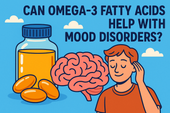
Can Omega-3 Fatty Acids Help with Mood Disorders?
Omega-3 fatty acids do more than support heart health — they can help balance mood, reduce depression, and calm anxiety. Discover how EPA and DHA nourish your brain, fight inflammation, and support emotional well-being from within. 🌊🧠
-

Vitamin D and Mood: The Sunshine Vitamin for Emotional Balance
Could the key to emotional balance be as simple as a little sunlight? Discover how vitamin D — the sunshine vitamin — influences serotonin, reduces inflammation, and helps you feel more positive and resilient year-round. ☀️💛
-

The Role of Magnesium in Reducing Irritability and Low Mood
Feeling on edge or emotionally drained? Magnesium could be the missing link between your body and your mood. Discover how this essential mineral reduces irritability, balances neurotransmitters, and helps your nervous system find calm again. 🌿✨
-
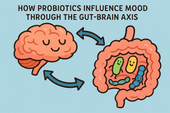
How Probiotics Influence Mood Through the Gut-Brain Axis
Discover how probiotics can do more than support your digestion—they can actually uplift your mood. This article explores the fascinating gut-brain axis and how balancing your gut bacteria through probiotics may help reduce anxiety, improve emotional stability, and support long-term mental well-being. 🌿🧠
-
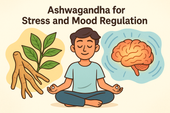
Ashwagandha for Stress and Mood Regulation
Discover how Ashwagandha, the powerful adaptogenic herb 🌿, helps your body manage stress and regulate mood. Learn how it balances cortisol, boosts GABA and serotonin, and supports emotional stability — helping you feel calm, focused, and resilient every day.
-
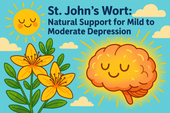
St. John’s Wort: Natural Support for Mild to Moderate Depression
Discover how St. John’s Wort, the “sunshine herb” 🌼, naturally supports mild to moderate depression. Learn how it boosts serotonin, balances mood, and promotes emotional resilience — with research showing its effectiveness compares to antidepressants, but with fewer side effects.
-
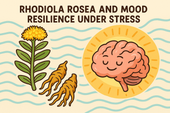
Rhodiola Rosea and Mood Resilience Under Stress
Discover how Rhodiola rosea helps your body adapt to stress 🌿. Learn how this powerful adaptogen balances cortisol, supports serotonin and dopamine, and strengthens emotional resilience — helping you stay calm, focused, and energized under pressure.
-
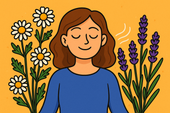
Chamomile and Lavender: Herbal Calm for Emotional Fluctuations
Discover how chamomile and lavender bring calm to emotional ups and downs 🌿. Learn how these two soothing herbs balance your nervous system, ease anxiety, and support restful sleep — naturally helping you find peace and emotional stability.
-
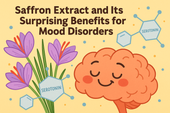
Saffron Extract and Its Surprising Benefits for Mood Disorders
Discover how saffron extract — the golden spice of joy 🌸 — can naturally support mood balance, ease anxiety, and lift mild depression. Learn what science says about its serotonin-boosting power, the ideal dosage, and how this ancient remedy compares to modern antidepressants.
-
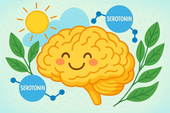
5-HTP and Serotonin: A Natural Path to Lifting Mood
Discover how 5-HTP naturally boosts serotonin 🌞 — the neurotransmitter behind mood, sleep, and emotional balance. Learn how this plant-derived compound supports happiness, reduces anxiety, and improves rest by helping your brain create more serotonin the gentle, natural way.
-
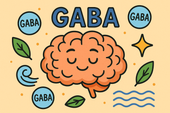
GABA Supplements for Reducing Anxiety and Mood Swings
Discover how GABA supplements can help reduce anxiety and balance mood naturally 🌿. Learn how this calming neurotransmitter works to quiet the mind, ease stress, and improve sleep — plus which nutrients and habits can boost your body’s own GABA production for long-term emotional stability.
-
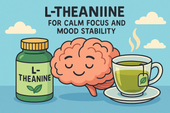
L-Theanine for Calm Focus and Mood Stability
Discover how L-theanine, the calming compound found in green tea 🍵, promotes focus, relaxation, and mood stability. Learn the science behind how it balances neurotransmitters, reduces stress hormones, and enhances clarity — helping you stay centered, calm, and productive without sedation.
-
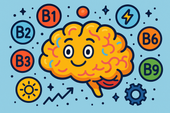
B Vitamins and Brain Chemistry: Supporting Energy and Emotional Balance
Discover how B vitamins power your brain chemistry ⚡. Learn how B6, B9, and B12 support serotonin, dopamine, and energy production — helping boost focus, mood, and emotional balance. From diet to supplements, explore how this vital nutrient group keeps your mind resilient and your energy steady.
-

N-Acetyl Cysteine (NAC) and Mood Disorders: What the Research Says
Learn how N-Acetyl Cysteine (NAC) supports brain health and mood balance 🧠. Discover how this antioxidant helps reduce oxidative stress, regulate glutamate, and improve emotional stability in depression, bipolar disorder, and anxiety — backed by cutting-edge psychiatric research.
-

Supplements for Bipolar Disorder: What May Support Stability
Discover the best supplements for bipolar disorder 🌿 that may support emotional stability and brain health. Learn how nutrients like omega-3s, magnesium, vitamin D, and NAC can help reduce inflammation, balance neurotransmitters, and complement traditional treatment safely.


















































